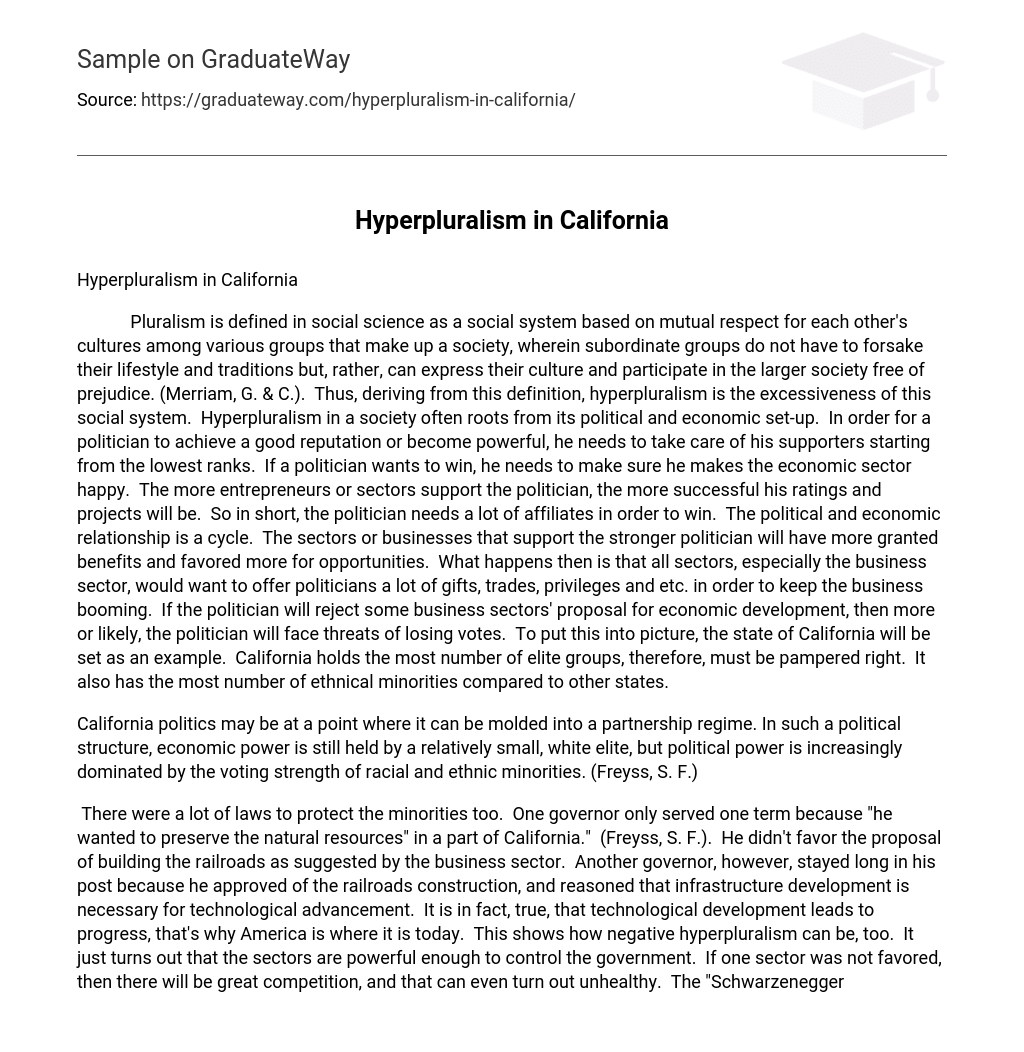Pluralism is defined in social science as a social system based on mutual respect for each other’s cultures among various groups that make up a society, wherein subordinate groups do not have to forsake their lifestyle and traditions but, rather, can express their culture and participate in the larger society free of prejudice. (Merriam, G. ; C.). Thus, deriving from this definition, hyperpluralism is the excessiveness of this social system. Hyperpluralism in a society often roots from its political and economic set-up. In order for a politician to achieve a good reputation or become powerful, he needs to take care of his supporters starting from the lowest ranks. If a politician wants to win, he needs to make sure he makes the economic sector happy. The more entrepreneurs or sectors support the politician, the more successful his ratings and projects will be. So in short, the politician needs a lot of affiliates in order to win. The political and economic relationship is a cycle. The sectors or businesses that support the stronger politician will have more granted benefits and favored more for opportunities. What happens then is that all sectors, especially the business sector, would want to offer politicians a lot of gifts, trades, privileges and etc. in order to keep the business booming. If the politician will reject some business sectors’ proposal for economic development, then more or likely, the politician will face threats of losing votes. To put this into picture, the state of California will be set as an example. California holds the most number of elite groups, therefore, must be pampered right. It also has the most number of ethnical minorities compared to other states.
California politics may be at a point where it can be molded into a partnership regime. In such a political structure, economic power is still held by a relatively small, white elite, but political power is increasingly dominated by the voting strength of racial and ethnic minorities. (Freyss, S. F.)
There were a lot of laws to protect the minorities too. One governor only served one term because “he wanted to preserve the natural resources” in a part of California.” (Freyss, S. F.). He didn’t favor the proposal of building the railroads as suggested by the business sector. Another governor, however, stayed long in his post because he approved of the railroads construction, and reasoned that infrastructure development is necessary for technological advancement. It is in fact, true, that technological development leads to progress, that’s why America is where it is today. This shows how negative hyperpluralism can be, too. It just turns out that the sectors are powerful enough to control the government. If one sector was not favored, then there will be great competition, and that can even turn out unhealthy. The “Schwarzenegger Phenomenon” is said to be an obvious product of hyperpluralism. (Freyss, S. F.). Arnold Schwarzenegger, an icon of the entertainment world, was said to be perfect for the role. He is undoubtedly clueless about governance, even though he tries his best to be a governor. He passed bills that are highly questionable, but whatever his flaws are as a governor, it was often easily forgiven because everybody knows he doesn’t have political experience. This is the reason why California right now is believed to be very vulnerable to hyperpluralism.
Works Cited
Merriam, G. ; C. 1913. Webster’s Revised Unabridged Dictionary. August 12,
2008. [http://en.wiktionary.org/wiki/pluralism].
Freyss, S. F. 2004. The Schwarzenegger Phenomenon: A Leader for Hyperpluralistic Times
– And More. California State University, Los Angeles. August 12, 2008. [http://www.patbrowninstitute.org/publications/documents/op6-2004.pdf].
;





